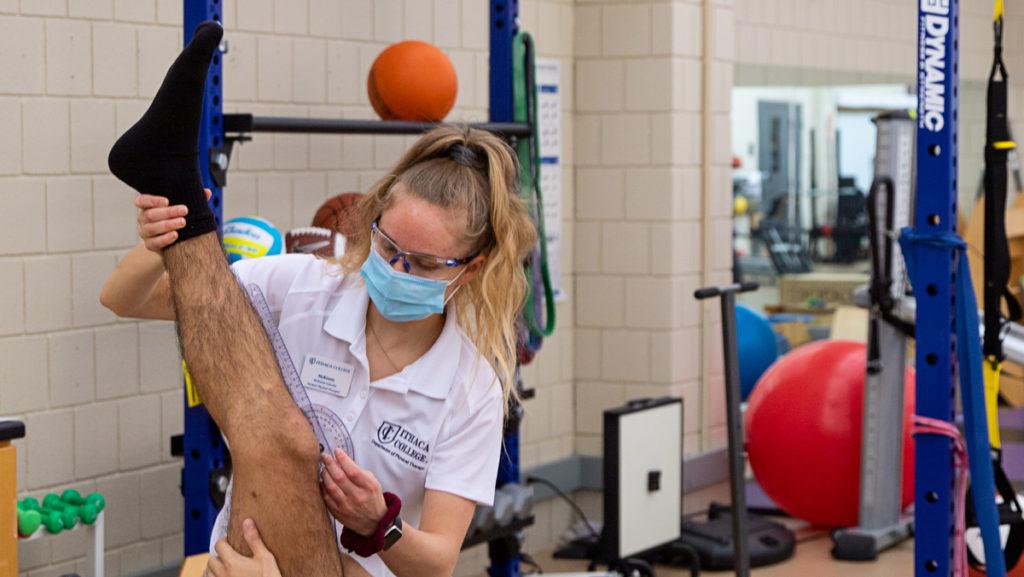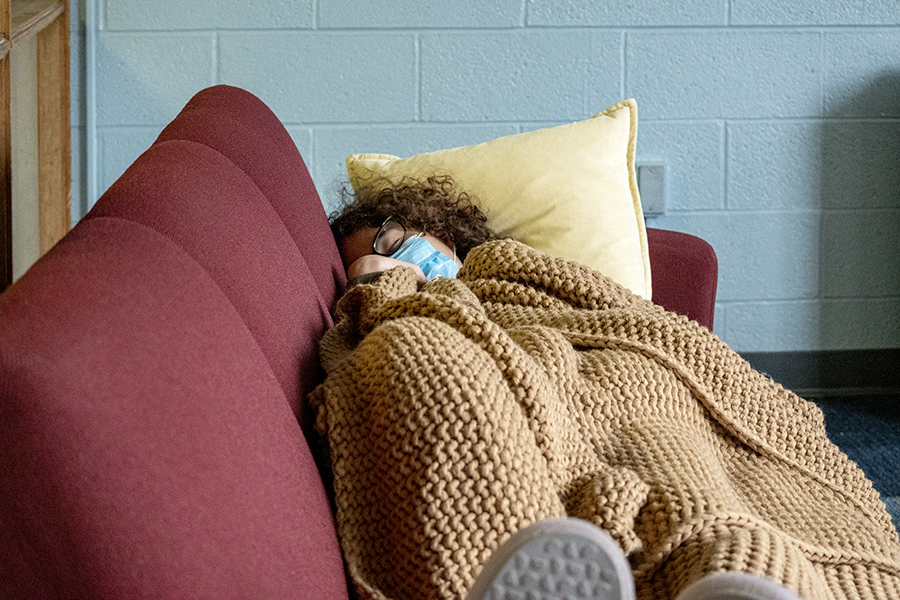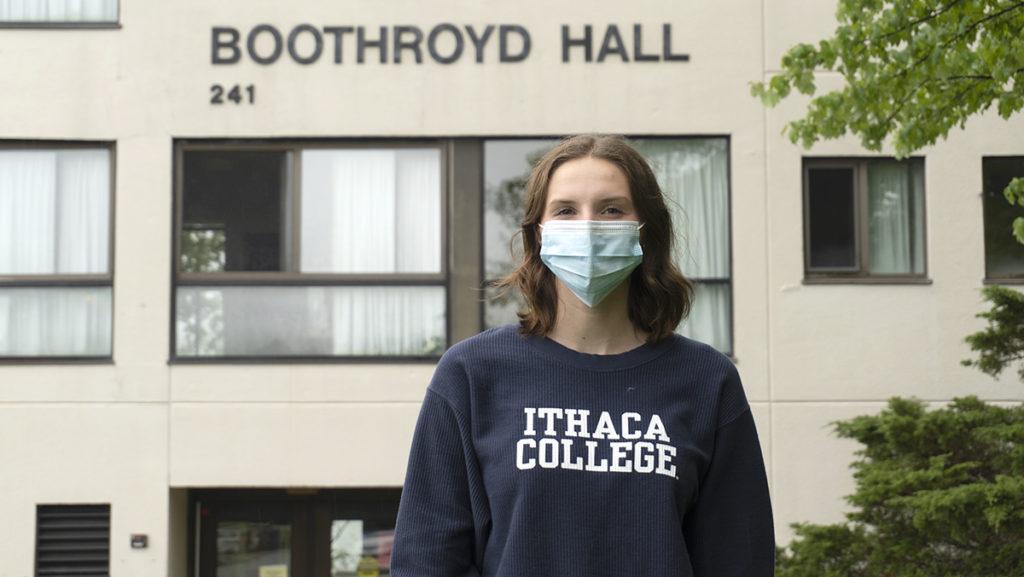Although clinics within the School of Health Sciences and Human Performance (HSHP) at Ithaca College are emptier and have fewer patients and staff than previous years, clinical students are still working to get hands-on experiences and assist the community.
The Sir Alexander Ewing-Ithaca College Speech and Hearing Clinic is currently offering in-person service only to the hearing portion of the clinic. These audiology clients can also receive service through teletherapy and curbside service. Speech-language pathology services are being offered remotely through telepractice. The Occupational and Physical Therapy Clinic (OT/PT Clinic) is also offering in-person and telepractice services this semester. The clinicians can work hands-on with patients while wearing safety gear like gloves, face shields, goggles and masks.
In the fall semester, the clinics mostly operated through telepractice, except for the PT clinic, which treated a fellow student–clinician and a staff member in person. The college held classes primarily remotely for Fall 2020, but some students were allowed on campus for the PT Boot Camp.
In addition to telepractice, Amie Germain, assistant professor in the Department of Occupational Therapy and OT/PT Clinic faculty member, said the OT clinic held virtual therapy sessions with families through Zoom for students to learn how to engage with children in an online setting.
Chris McNamara, clinical associate professor and clinic director of the Department of Physical Therapy, said that in the fall, both PT and OT students did case study-based learning scenarios. These are published cases of patients or made-up cases that allow students to work through the mechanics of developing a care plan.
First-year physical therapy graduate student Tayo Akinboboye, a student–clinician, said the OT/PT Clinic opened Jan. 25. Akinboboye said that when the clinic opened, he and the other student–clinicians learned about the rules and started working in the clinic. Akinboboye said that by Feb. 1, they had their first client.
McNamara said the OT/PT Clinic is open to approved on-campus college community members, and patients must complete the daily health screening to access the clinic. She said the clinic is currently not treating pediatric patients in person because they are typically accompanied by parents or siblings, and the clinic cannot fit additional people due to lowered room capacity.
The clinic is not treating individuals with neurological impairments face-to-face either because these individuals usually have more of a complex health status and are being treated remotely instead, McNamara said. The clinic is also not currently treating Longview residents, who have typically received treatment at the clinic, in person. The college and Longview have been partnered for over 20 years, but this semester the partnership is operating remotely.
The hearing clinic opened in person Feb. 8. Amy Rominger, clinical associate professor in the Department of Speech-Language Pathology and Audiology, said the in-person services are only offered to community members who are approved to access the campus. Patients have to complete the daily health screening provided by the college and answer additional health questions prior to their arrival.
Patients must wear masks during appointments, and clinicians must wear masks, gloves and face shields, Rominger said. In addition to the new safety equipment, the hearing clinic no longer reuses supplies.
“This is where infection control and budget concerns always come to play,” she said. “Anything that was multi-use before is now single use as far as supplies go, with the exception, certainly, of the actual equipment that we have. We just disinfect and sanitize that.”
First-year occupational therapy graduate student Jessica Freeborn said similar protective gear is worn in the OT/PT Clinic. She said OT student–clinicians wear masks and goggles and remain socially distant from each other and patients.
Akinboboye said the PT students wear the same protective gear with the option to wear a face shield instead of goggles and gloves depending on whether the clinician or client wants them.
The hearing clinic is operating with fewer student–clinicians at once. Rominger said that previously, she would have two student–clinicians with her at all times. She said that due to the lower patient population they are seeing this semester and wanting to rotate student–clinicians for a week or two each, only one student–clinician is working with Rominger at a time.
First-year speech-language pathology graduate student Kate Quigley worked in the hearing clinic for the first time Feb. 18. She said she had one hour of direct client contact, and she was able to administer a hearing evaluation to a client.
She said that this semester each student–clinician will have approximately three clients and work five to six hours per week through telepractice and in-person work combined.
McNamara said the OT/PT Clinic is not using its waiting room this semester and has gone paperless to protect clients and clinicians. She said the PT clinic is having students mostly work in pods of four and occasionally in pairs. McNamara said the clinic’s goal is to have each student work with one patient.
Germain said the OT student–clinicians are working in smaller groups than PT due to the density requirements of the OT rooms.
Freeborn said she is working with one other student in the OT clinic.
“That’s been working well,” Freeborn said. “It’s a very personalized experience, so we can just bounce ideas off each other and just have more of a personal aspect to therapy. We just treat one client together.”
Student–clinicians who are working in person at the hearing and OT/PT clinics are eligible to get the COVID-19 vaccine. McNamara said that Christina Moylan, director of Public Health Emergency Preparedness at the college, worked directly with the Tompkins County Health Department and the Cayuga Health System to submit a list of which groups at the college would need the vaccine including the student–clinicians working in the clinics. In New York state, health care workers are considered a “priority group” eligible for the vaccine.
Quigley said it was exciting to be in the clinic and to get in-person experience. She said she believes every proper safety protocol is being followed.
“I felt 100% comfortable,” Quigley said. “Of course I wanted to make sure the client also felt comfortable because there were some things that we had to get closer to the client than others, so it’s all about the client’s preference. But with the proper protocols we have in place, I felt really safe, and I didn’t really have much concern.”
Akinboboye said he has enjoyed his experience working in the clinic, and he appreciates the interpersonal relationships between PT, OT and speech-language pathology students.
Freeborn said she values the opportunity that working in the OT clinic provides.
“Personally, I think that it’s a great experience, especially because a lot of the OT students will be going on their first round of clinicals or fieldwork experiences at the end of March,” Freeborn said. “For me it’s like a really great way to kind of get my toes wet and see what this might be like when I go on fieldwork, whether it’s telehealth or different protocols with sanitization or [personal protective equipment] and how treating clients and in person or face-to-face might look different.”











